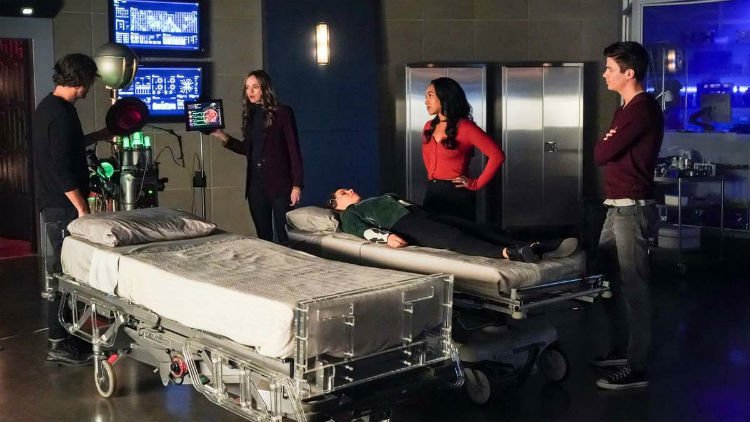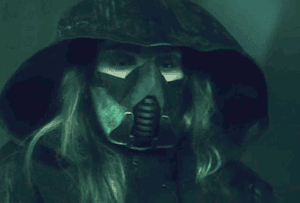
“The future isn’t always what it seems. We decide what it gets to be.”
In an attempt to take down the murderous Cicada, Team Flash (thanks to Sherloque and his connections to Earth-221) get their hands on the Memory Machine: a device that will allow them to enter the mind of Grace, the villain’s comatose niece, in an effort to stop the big bad’s meta-killing rampage. It’s a good plan but, considering we’ve just hit the halfway mark in Season Five, the mission’s failure isn’t really in question. But it does build towards the resolution of Cicada’s arc…and hints at what could be.

The setup for “Memorabilia” is nothing new: afraid that the memories of her partnership with Eobard Thawne will be discovered, Nora uses the Memory Machine to plunge into Grace’s mind without backup. It comes as no surprise when she gets stuck, trapped in the young girl’s traumatized mind. It’s up to Barry and Iris to rescue their daughter before the defense mechanisms in Grace’s mind tear Nora apart.
In that regard, there are some portions of “Memorabilia” that play out in a similar way to Inception, where the visual representation of images in someone’s mind is not necessarily truth—rather it’s that person’s reality, or perception, of events the viewer experiences. This is such a vital difference, in both real life, as well as in The Flash.
Ever since she revealed herself to the gang, Nora has harped about the difficult childhood she had, without a father and with a mother who was mean and uncaring. As it turns out, the anger at feeling alone and afraid twisted those memories, and she projected those feelings as the fault of the future Iris. Initially, that change in the narrative felt as if it was the writers’ goal to make sure Iris’s reputation remains pristine and pure as the driven snow but, when I stepped back from it, the decision wasn’t so bad. Yes, Iris as a less than loving mother would have better acted as a motivator for Nora seeking answers from Thawne but, despite the misrepresentation of her future self in that regard, she still did an almost unforgivable thing in suppressing Nora’s true self.

But even the mending of old wounds doesn’t seem like it will change Nora’s plans to change the future. Plans that, based on the founding date of Iris’s newspaper changing, are moving forward. The problem that remains is when the others find out about her collaboration with the Reverse Flash—a truth that Sherloque is closing in on—how will that affect the West-Allen dynamic? And more pressing, how badly will Nora’s meddling with time completely wreck the timeline? Her actions have already twisted the events as they pertain to Cicada, a fact that she really hasn’t acknowledged, so what happens when Thawne gets what he wants (freedom)? That has the potential to do more damage than even Cicada.

Speaking of the big-bad, there’s a possibility that Orlin may not be as in control of things as we’d like to believe. It may be a far-out theory but, considering a shard of the dark matter infused satellite’s rattling around in Grace’s brain, coupled with her feelings on metas (one did kill her parents) and her own Cicada avatar in her head, what if she’s somehow linked with her Uncle Orlin on his crusade to rid the world of metas? More shocking would be if somehow her subconscious will is driving him to commit this atrocious acts of violence. It would be a bold move to have the child as the real villain—one I doubt the writers will take—but, considering the last shot we get of her at the table with her Cicada persona sitting across from her, it promises that Grace has a bigger role to play than being Orlin’s motivations. Now that would be a twist reminiscent of a good M Night Shyamalan flick.
Flash Facts
- It’s always great to catch the pop culture and comic references in The Flash. No other genre show does it quite as well (except maybe Supernatural). I’m not sure if Kamilla, the bartender that could become a love interest for Cisco, is one of those comic references, but the Red Death is 100% that. For those not in the know, the Red Death was introduced in 2017’s Dark Knights: Metal crossover and was a Batman wholly corrupted by fear infused with the Flash. Whether that is just a fun nod to the comics or a portent to a future season villain—either in The Flash or another Arrowverse series—remains to be seen.
- Cisco’s work on the cure may be more important than we first believed. Barry’s idea to use said cure on Orlin makes a lot of sense. The question becomes will that be enough? Considering that his powers are derived in part from meta tech, I’m not so certain introducing said cure would be enough. Add the possibility of Grace being an additional variable and that cure equation gets a bit more sketchy.
![]()
